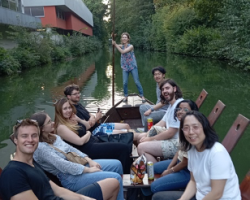
Last week the lab went on its very first Stocherkahn (punting) trip together! Punting on a Stocherkahn along the Neckar river is a common activity during the summer time here in Tübingen, where you can relish in the sunshine and...

Last week the lab went on its very first Stocherkahn (punting) trip together! Punting on a Stocherkahn along the Neckar river is a common activity during the summer time here in Tübingen, where you can relish in the sunshine and...
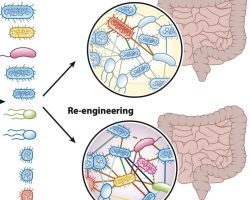
Bringing genetics to the microbiome. Group leader James Marsh and Ph.D student Christian Kirk this week saw the publication of their review in Annual Review of Microbiology: Toward Microbiome Engineering: Expanding the Repertoire of Genetically Tractable Members of the Human...

Congratulations to Sara Clasen, Grand Prize Winner of the NOSTER & Science Microbiome Prize. The NOSTER & Science Microbiome Prize is awarded for the best essay submitted by young investigators in the rapidly evolving field of microbiome research. The prize...

On December 14, Leonardo Moreno successfully defended his thesis, titled “On Bioinformatics of the Human Gut,” for which he earned the distinguished Magna Cum Laude distinction. During his PhD, he correlated bacterial and viral diversity in the human gut, revealing...
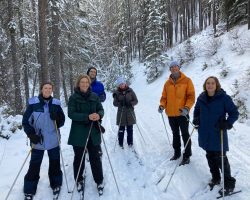
In December a portion of the lab traveled to snowy Banff, Canada to attend the Keystone Symposia Meeting “The Human Microbe: Ecology and Evolution.” Ruth presented a talk on the lab’s recent findings on silent recognition of human gut bacterial...
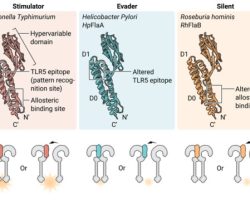
Our recent discovery of silent flagellin in the human gut was featured in Science Immunology: Hannah Baer, Shruti Sandilya and Theodore Steiner: Evading the Toll Booth: How “silent” flagellin may bind yet fail to activate TLR5 The nature of flagellin–Toll-like...
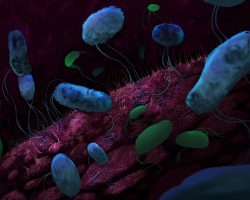
Here, we address the long-standing question of how benign gut microbes evade the immune system. We identified a new type of flagellin in the human gut, termed ‘silent flagellin,’ that binds to the immune receptor Toll-like receptor 5 without inducing...
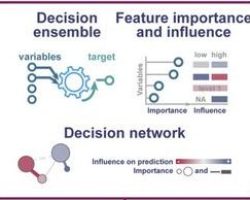
Former graduate student Albane Ruaud recently saw her machine learning tool published in PLoS Comp Bio: Ruaud A, Pfister N, Ley RE, Youngblut ND. Interpreting tree ensemble machine learning models with endoR. PLoS Computational Biology Dec 14;18(12):e1010714. (2022). Use endoR...
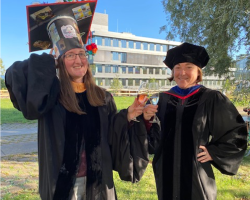
Last week, Jessica (Jess) Sutter successfully defended her thesis titled “Phylogeny, pangenomics, and predicted functional diversity of maize rhizosphere Pseudomonas”. The work of Jess investigates a phenomenon observed in a study of the maize rhizosphere microbiome in a field study...

Our new paper on the evolutionary histories of the human gut microbiota is out in Science. The work was led by Taichi Suzuki and Liam Fitzstevens along with the Ley lab team: Victor Schmidt, Hagay Enav, Kelsey Huus, and Mirabeau...
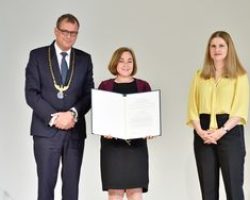
Congratulations to Ruth Ley, who was awarded a certificate in recognition of her induction into the Leopoldina Academy during the annual ceremony held in Halle (Saale). This solidifies Ruth’s membership that began in 2020 and is another accolade to add...
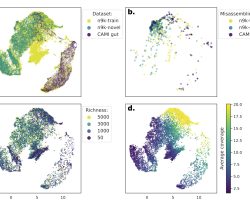
Our new pre-print is up on bioRxiv! Led by Nicholas Youngblut, this work presents ResMiCo, a powerful tool for optimising metagenome assemblies. Metagenome assembly is increasing in popularity due to decreasing Illumina sequencing costs and easier library preparation methods. Unfortunately,...
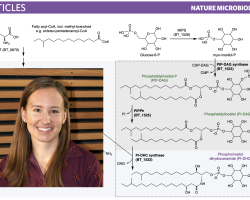
While inositol lipids are ubiquitous in eukaryotes and have finely tuned roles in cellular signalling and membrane homoeostasis, bacterial inositol lipids were previously thought to be limited largely to PI-DAG synthesis in Actinobacteria as discribed for the obligate intracellular pathogen...

“It’s time to make the survey of humanity’s ‘second genome’ more complete.” A perspective piece on how to fill in the microbiome map by Ruth E. Ley. “This week marks the tenth anniversary of the first big survey of microbial...

Congratulations to Prof. Ruth Ley who has joined the Board of Trustees of the Jung Foundation! The Jung Foundation for Science and Research was established in 1967 by Ernst Emil Jung to promote science and social commitment. Since 1975, the...

Yesterday, Jacobo successfully defended his thesis titled “Insights into the human gut microbiome and its link with obesity and cardiometabolic diseases”. During the last 4.5 years in the Ley Lab he has developed new methods and computational approaches to study...
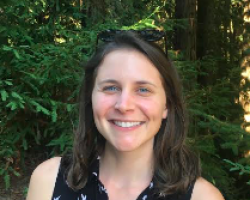
Congratulations to Lara Berg for successfully completing her Masters degree in the Ley Lab! For her thesis, Lara charaterised strain-level metabolic and syntrophic variations in the dominant human gut methanogen, Methanobrevibacter smithii. Using M. smithii samples obtained from stool samples...
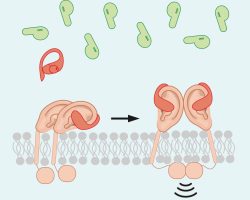
This week saw the release of our latest pre-print on bioRxiv! Titled Silent recognition of flagellins from human gut commensal bacteria by Toll-like receptor 5, this work was led by postdoc Sara Clasen and describes a mechanism for how the...

Congratulations are in order for Paul OG Jorzik, who has successfully completed his Master’s degree. Paul completed his thesis in the Ley Lab where he worked on the development of novel genetic systems for non-model human gut-associated bacteria. Congratulations Paul!
...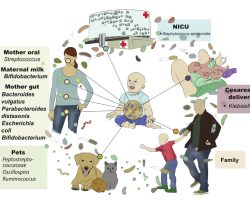
A new review article was published today from postdoc Hagay Enav and Ruth Ley, discussing strain level colonisation of the developing infant gut microbiome. While the establishment of the infant microbiome has long been an area of interest, recent technological...

Last week the lab went on its very first Stocherkahn (punting) trip together! Punting on a Stocherkahn along the Neckar river is a common activity during the summer time here in Tübingen, where you can relish in the sunshine and...

Bringing genetics to the microbiome. Group leader James Marsh and Ph.D student Christian Kirk this week saw the publication of their review in Annual Review of Microbiology: Toward Microbiome Engineering: Expanding the Repertoire of Genetically Tractable Members of the Human...

Congratulations to Sara Clasen, Grand Prize Winner of the NOSTER & Science Microbiome Prize. The NOSTER & Science Microbiome Prize is awarded for the best essay submitted by young investigators in the rapidly evolving field of microbiome research. The prize...

On December 14, Leonardo Moreno successfully defended his thesis, titled “On Bioinformatics of the Human Gut,” for which he earned the distinguished Magna Cum Laude distinction. During his PhD, he correlated bacterial and viral diversity in the human gut, revealing...

In December a portion of the lab traveled to snowy Banff, Canada to attend the Keystone Symposia Meeting “The Human Microbe: Ecology and Evolution.” Ruth presented a talk on the lab’s recent findings on silent recognition of human gut bacterial...

Our recent discovery of silent flagellin in the human gut was featured in Science Immunology: Hannah Baer, Shruti Sandilya and Theodore Steiner: Evading the Toll Booth: How “silent” flagellin may bind yet fail to activate TLR5 The nature of flagellin–Toll-like...

Here, we address the long-standing question of how benign gut microbes evade the immune system. We identified a new type of flagellin in the human gut, termed ‘silent flagellin,’ that binds to the immune receptor Toll-like receptor 5 without inducing...

Former graduate student Albane Ruaud recently saw her machine learning tool published in PLoS Comp Bio: Ruaud A, Pfister N, Ley RE, Youngblut ND. Interpreting tree ensemble machine learning models with endoR. PLoS Computational Biology Dec 14;18(12):e1010714. (2022). Use endoR...

Last week, Jessica (Jess) Sutter successfully defended her thesis titled “Phylogeny, pangenomics, and predicted functional diversity of maize rhizosphere Pseudomonas”. The work of Jess investigates a phenomenon observed in a study of the maize rhizosphere microbiome in a field study...

Our new paper on the evolutionary histories of the human gut microbiota is out in Science. The work was led by Taichi Suzuki and Liam Fitzstevens along with the Ley lab team: Victor Schmidt, Hagay Enav, Kelsey Huus, and Mirabeau...

Congratulations to Ruth Ley, who was awarded a certificate in recognition of her induction into the Leopoldina Academy during the annual ceremony held in Halle (Saale). This solidifies Ruth’s membership that began in 2020 and is another accolade to add...

Our new pre-print is up on bioRxiv! Led by Nicholas Youngblut, this work presents ResMiCo, a powerful tool for optimising metagenome assemblies. Metagenome assembly is increasing in popularity due to decreasing Illumina sequencing costs and easier library preparation methods. Unfortunately,...

While inositol lipids are ubiquitous in eukaryotes and have finely tuned roles in cellular signalling and membrane homoeostasis, bacterial inositol lipids were previously thought to be limited largely to PI-DAG synthesis in Actinobacteria as discribed for the obligate intracellular pathogen...

“It’s time to make the survey of humanity’s ‘second genome’ more complete.” A perspective piece on how to fill in the microbiome map by Ruth E. Ley. “This week marks the tenth anniversary of the first big survey of microbial...

Congratulations to Prof. Ruth Ley who has joined the Board of Trustees of the Jung Foundation! The Jung Foundation for Science and Research was established in 1967 by Ernst Emil Jung to promote science and social commitment. Since 1975, the...

Yesterday, Jacobo successfully defended his thesis titled “Insights into the human gut microbiome and its link with obesity and cardiometabolic diseases”. During the last 4.5 years in the Ley Lab he has developed new methods and computational approaches to study...

Congratulations to Lara Berg for successfully completing her Masters degree in the Ley Lab! For her thesis, Lara charaterised strain-level metabolic and syntrophic variations in the dominant human gut methanogen, Methanobrevibacter smithii. Using M. smithii samples obtained from stool samples...

This week saw the release of our latest pre-print on bioRxiv! Titled Silent recognition of flagellins from human gut commensal bacteria by Toll-like receptor 5, this work was led by postdoc Sara Clasen and describes a mechanism for how the...

Congratulations are in order for Paul OG Jorzik, who has successfully completed his Master’s degree. Paul completed his thesis in the Ley Lab where he worked on the development of novel genetic systems for non-model human gut-associated bacteria. Congratulations Paul!
...
A new review article was published today from postdoc Hagay Enav and Ruth Ley, discussing strain level colonisation of the developing infant gut microbiome. While the establishment of the infant microbiome has long been an area of interest, recent technological...